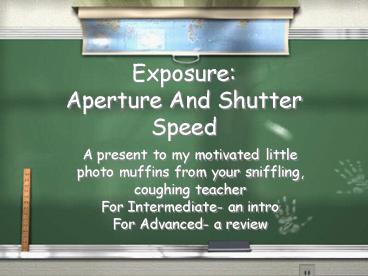Exposure: Aperture And Shutter Speed - PowerPoint PPT Presentation
1 / 16
Title:
Exposure: Aperture And Shutter Speed
Description:
... and tricky at first, but this should make your life WAY easier in the darkroom. ... In the darkroom, you make a test strip to determine the perfect amount of light ... – PowerPoint PPT presentation
Number of Views:807
Avg rating:3.0/5.0
Title: Exposure: Aperture And Shutter Speed
1
ExposureAperture And Shutter Speed
- A present to my motivated little photo muffins
from your sniffling, coughing teacher - For Intermediate- an intro
- For Advanced- a review
2
Exposure
- In Intermediate, we learn how to use the cameras
settings to get good negatives. - It can be a little complicated and tricky at
first, but this should make your life WAY easier
in the darkroom.
3
What happened in Beginning?
- You used a point-and-shoot camera, or a camera
set on Auto, to take pictures - Some of your negatives were dark, or dense,
others light - You HAD to make at least one test strip before
each print, because many prints requires many
different amounts of light to make a good picture
4
If this sounds complicated, dont worry! Click to
the next slide!
5
What you talkin bout, Willis?
- In the darkroom, you make a test strip to
determine the perfect amount of light to make a
good print, with blacks, whites, and grays in
between. - In the camera, there is also a perfect amount of
light to make a good negative. - Cameras on automatic are often guessing what
that right amount of light is. - Some cameras are better guessers than others.
6
Perhaps in beginning, you had some of each of
these types of negatives on a contact sheet.
7
An under-exposed negative happens when the film
doesnt get enough light (like when you shoot
your film indoors). You probably needed to use
a high filter to make a good print.
8
An over-exposed negative happens when the film
gets too much light. You probably had to make
your lens really bright, and use lots of clicks
to get a good print.
9
In Intermediate, we will learn how to make the
negative on the right, and save you time and
effort in the darkroom!
10
Exposure
- Exposure means the amount of light that hits the
film when you press the button- the shutter
button.
11
Exposure
- There are 2 things that control the amount of
light that hits the film- - The aperture, or opening of the lens
- The shutter speed, or the amount of time the
little curtain protecting your film opens for.
12
Getting the exposure right
The aperture refers to how wide the lens is open.
Each of the numbers below the opening represents
that size aperture.
- The shutter speed is the amount of time the
shutter is open for
13
Shutter Speed
- Each number on the shutter speed dial represents
the denominator of a fraction of a second. - 2000 is 1/2000 of a second
- 4 is 1/4 of a second
- 1 is a whole second
Shutter Speeds also control motion, or how blurry
the picture is. Well get to that later!
14
Getting the exposure right
- Aperture and Shutter Speed must work together!
15
- To get a good negative, you must adjust your
settings for the type of light in which you are
photographing.
16
Confused?
- Dont worry! Try your best to understand, and
well go over this next time I see you. - In the meantime, see if this guy on the internet
can explain better. - Make sure you click on BOTH links!
- Exposure
- Shutter Speed and Aperture































